新概念英语第二册83课课后习题详细答案
- 格式:doc
- 大小:26.00 KB
- 文档页数:2
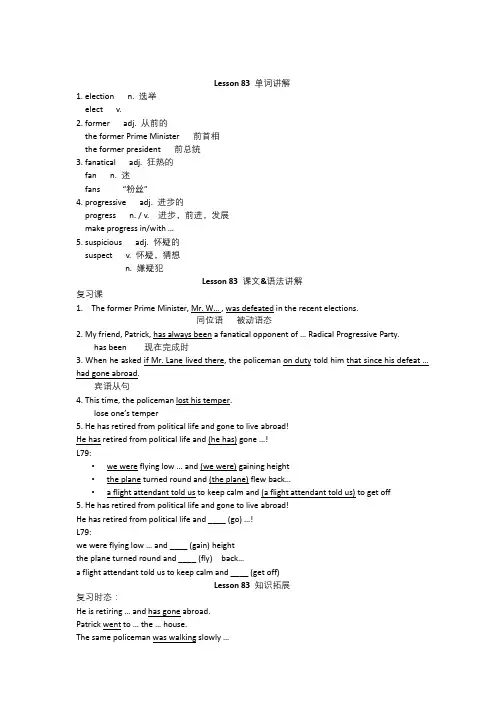
Lesson 83 单词讲解1. election n. 选举elect v.2. former adj. 从前的the former Prime Minister 前首相the former president 前总统3. fanatical adj. 狂热的fan n. 迷fans “粉丝”4. progressive adj. 进步的progress n. / v. 进步,前进,发展make progress in/with …5. suspicious adj. 怀疑的suspect v. 怀疑,猜想n. 嫌疑犯Lesson 83 课文&语法讲解复习课1. The former Prime Minister, Mr. W…, was defeated in the recent elections.同位语被动语态2. My friend, Patrick, has always been a fanatical opponent of … Radical Progressive Party.has been 现在完成时3. When he asked if Mr. Lane lived there, the policeman on duty told him that since his defeat …had gone abroad.宾语从句4. This time, the policeman lost his temper.lose one’s temper5. He has retired from political life and gone to live abroad!He has retired from political life and (he has) gone …!L79:•we were flying low … and (we were) gaining height•the plane turned round and (the plane) flew back…• a flight attendant told us to keep calm and (a flight attendant told us) to get off5. He has retired from political life and gone to live abroad!He has retired from political life and ____ (go) …!L79:we were flying low … and ____ (gain) heightthe plane turned round and ____ (fly) back…a flight attendant told us to keep calm and ____ (get off)Lesson 83 知识拓展复习时态:He is retiring … and has gone abroad.Patrick went to … the … house.The same policeman was walking slowly …I love to hear you say it.时态时vs. 态通过谓语动词的变化来体现共16 种过去现在将来过去将来一般√√√√进行√√完成√√完成进行。
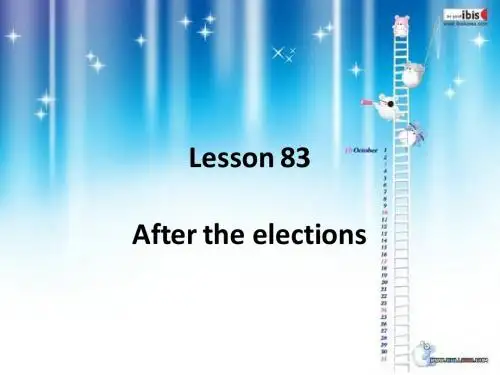
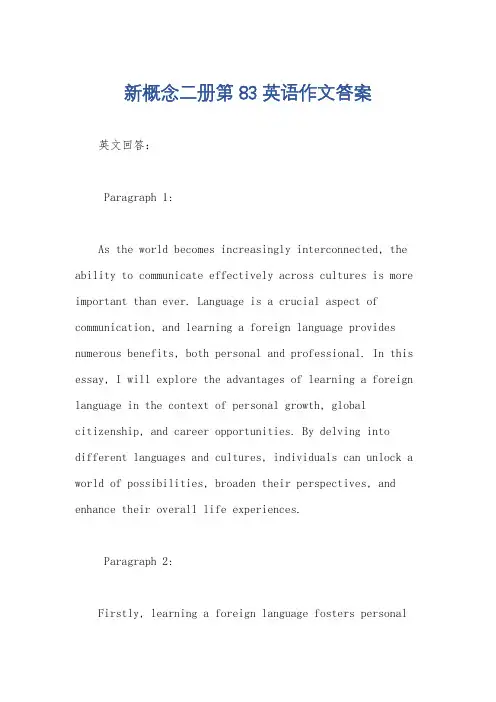
新概念二册第83英语作文答案英文回答:Paragraph 1:As the world becomes increasingly interconnected, the ability to communicate effectively across cultures is more important than ever. Language is a crucial aspect of communication, and learning a foreign language provides numerous benefits, both personal and professional. In this essay, I will explore the advantages of learning a foreign language in the context of personal growth, global citizenship, and career opportunities. By delving into different languages and cultures, individuals can unlock a world of possibilities, broaden their perspectives, and enhance their overall life experiences.Paragraph 2:Firstly, learning a foreign language fosters personalgrowth by expanding one's knowledge and cultural awareness. It challenges individuals to step outside their comfort zones, embrace new perspectives, and appreciate the diversity of the world. By immersing themselves in aforeign language, learners gain insights into different customs, beliefs, and ways of life. This exposure to other cultures promotes tolerance, understanding, and empathy, making individuals more well-rounded and adaptable in their personal lives.Paragraph 3:Secondly, learning a foreign language cultivates global citizenship. In a world where borders are increasingly blurred, the ability to communicate with people from different cultures is essential for fostering international cooperation and understanding. By mastering a foreign language, individuals become more connected to the global community. They can participate in international forums, engage in meaningful conversations with people from diverse backgrounds, and contribute to global discussions on issues that affect humanity as a whole. Language serves as abridge that connects people across geographical andcultural boundaries, enabling them to work together towards common goals.Paragraph 4:Moreover, learning a foreign language opens up a wide range of career opportunities. In today's globalized economy, employers value multilingual employees who can effectively communicate with clients and colleagues from around the world. Fluency in a foreign language can enhance job prospects, increase earning potential, and open doors to international assignments and collaborations. By possessing a foreign language skill, individuals gain a competitive advantage in the job market and expand their career horizons both domestically and internationally.Paragraph 5:In conclusion, learning a foreign language offers a myriad of benefits that extend beyond language proficiency. It fosters personal growth by broadening horizons andpromoting cultural understanding. It cultivates global citizenship by connecting individuals to the world community and enabling them to engage in global dialogues. Moreover, it opens up career opportunities in a globalized economy where multilingualism is increasingly valued. By embracing the world of languages, individuals can unlock their full potential, enrich their lives, and make meaningful contributions to society.中文回答:第一段:随着世界变得越来越紧密相联,跨文化有效沟通的能力变得比以往任何时候都更加重要。
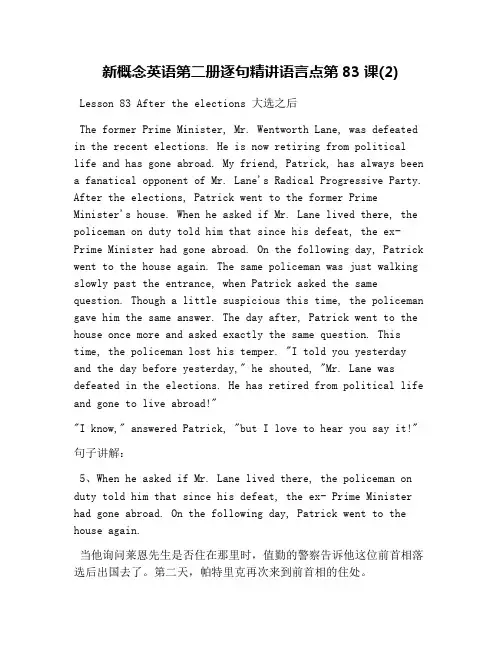
新概念英语第二册逐句精讲语言点第83课(2)Lesson 83 After the elections 大选之后The former Prime Minister, Mr. Wentworth Lane, was defeated in the recent elections. He is now retiring from political life and has gone abroad. My friend, Patrick, has always been a fanatical opponent of Mr. Lane's Radical Progressive Party. After the elections, Patrick went to the former PrimeMinister's house. When he asked if Mr. Lane lived there, the policeman on duty told him that since his defeat, the ex-Prime Minister had gone abroad. On the following day, Patrick went to the house again. The same policeman was just walking slowly past the entrance, when Patrick asked the same question. Though a little suspicious this time, the policeman gave him the same answer. The day after, Patrick went to the house once more and asked exactly the same question. This time, the policeman lost his temper. "I told you yesterday and the day before yesterday," he shouted, "Mr. Lane was defeated in the elections. He has retired from political life and gone to live abroad!""I know," answered Patrick, "but I love to hear you say it!"句子讲解:5、When he asked if Mr. Lane lived there, the policeman on duty told him that since his defeat, the ex- Prime Minister had gone abroad. On the following day, Patrick went to the house again.当他询问莱恩先生是否住在那里时,值勤的警察告诉他这位前首相落选后出国去了。
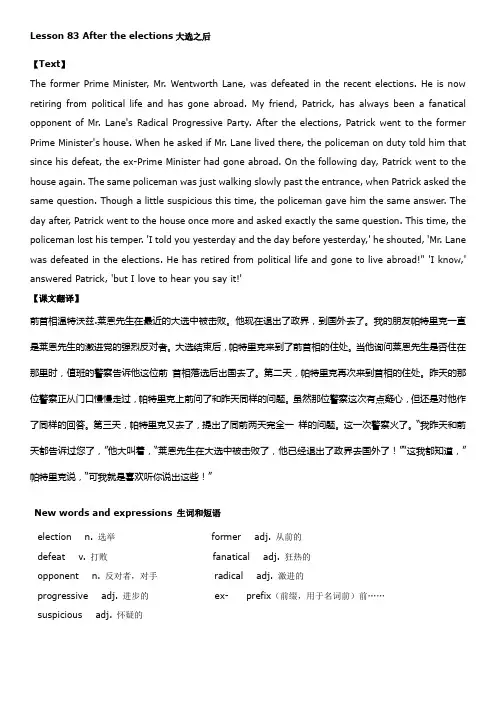
Lesson 83 After the elections大选之后【Text】The former Prime Minister, Mr. Wentworth Lane, was defeated in the recent elections. He is now retiring from political life and has gone abroad. My friend, Patrick, has always been a fanatical opponent of Mr. Lane's Radical Progressive Party. After the elections, Patrick went to the former Prime Minister's house. When he asked if Mr. Lane lived there, the policeman on duty told him that since his defeat, the ex-Prime Minister had gone abroad. On the following day, Patrick went to the house again. The same policeman was just walking slowly past the entrance, when Patrick asked the same question. Though a little suspicious this time, the policeman gave him the same answer. The day after, Patrick went to the house once more and asked exactly the same question. This time, the policeman lost his temper. 'I told you yesterday and the day before yesterday,' he shouted, 'Mr. Lane was defeated in the elections. He has retired from political life and gone to live abroad!" 'I know,' answered Patrick, 'but I love to hear you say it!'【课文翻译】前首相温特沃兹.莱恩先生在最近的大选中被击败。
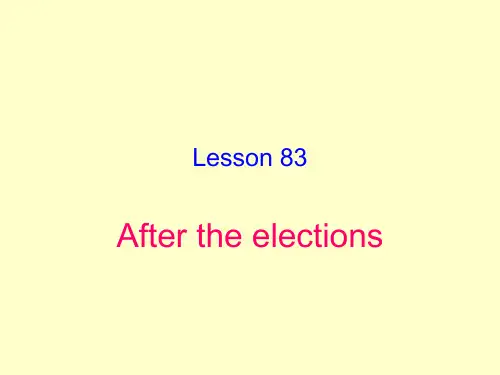
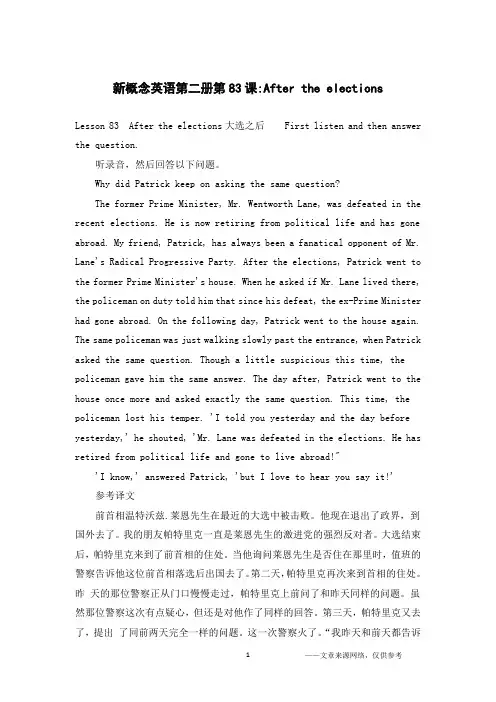
新概念英语第二册第83课:After the electionsLesson 83 After the elections大选之后First listen and then answer the question.听录音,然后回答以下问题。
Why did Patrick keep on asking the same question?The former Prime Minister, Mr. Wentworth Lane, was defeated in the recent elections. He is now retiring from political life and has gone abroad. My friend, Patrick, has always been a fanatical opponent of Mr. Lane's Radical Progressive Party. After the elections, Patrick went to the former Prime Minister's house. When he asked if Mr. Lane lived there, the policeman on duty told him that since his defeat, the ex-Prime Minister had gone abroad. On the following day, Patrick went to the house again. The same policeman was just walking slowly past the entrance, when Patrick asked the same question. Though a little suspicious this time, the policeman gave him the same answer. The day after, Patrick went to the house once more and asked exactly the same question. This time, the policeman lost his temper. 'I told you yesterday and the day before yesterday,' he shouted, 'Mr. Lane was defeated in the elections. He has retired from political life and gone to live abroad!"'I know,' answered Patrick, 'but I love to hear you say it!'参考译文前首相温特沃兹.莱恩先生在最近的大选中被击败。
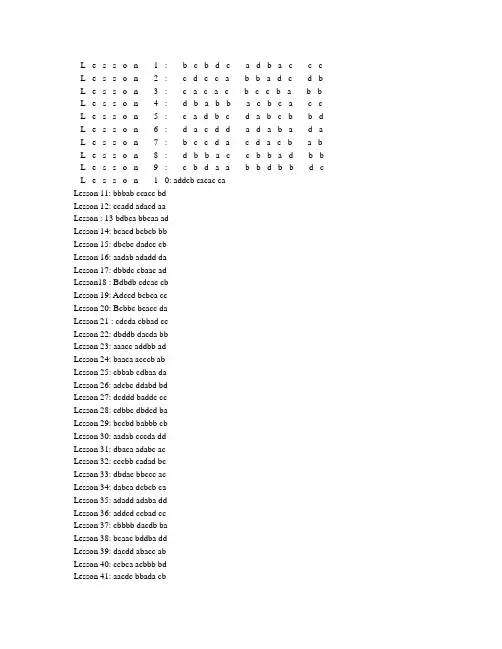
L e s s o n 1 : b c b d c a d b a c c c L e s s o n 2 : c d c c a b b a d c d b L e s s o n 3 : c a c a c b c c b a b b L e s s o n 4 : d b a b b a c b c a c c L e s s o n 5 : c a d b c d a b c b b d L e s s o n 6 : d a c d d a d a b a d a L e s s o n 7 : b c c d a c d a c b a b L e s s o n 8 : d b b a c c b b a d b b L e s s o n 9 : c b d a a b b d b b d c L e s s o n 1 0: addcb cacac caLesson 11: bbbab ccacc bdLesson 12: ccadd adacd aaLesson : 13 bdbca bbcaa adLesson 14: bcacd bcbcb bbLesson 15: dbcbc dadcc cbLesson 16: aadab adadd daLesson 17: dbbdc cbaac adLesson18 : Bdbdb cdcac cbLesson 19: Adccd bcbca ccLesson 20: Bcbbc bcacc daLesson 21 : cdcda cbbad ccLesson 22: dbddb dacda bbLesson 23: aaacc addbb adLesson 24: baaca acccb abLesson 25: cbbab cdbaa daLesson 26: adcbc ddabd bdLesson 27: dcddd baddc ccLesson 28: cdbbc dbdcd baLesson 29: bccbd babbb cbLesson 30: aadab cccda ddLesson 31: dbaca adabc acLesson 32: cccbb cadad bcLesson 33: dbdac bbccc acLesson 34: dabca dcbcb caLesson 35: adadd adaba ddLesson 36: addcd ccbad ccLesson 37: cbbbb dacdb baLesson 38: bcaac bddba ddLesson 39: dacdd abacc abLesson 40: ccbca acbbb bdLesson 41: aacdc bbada cbLesson 42: dddbb cddac daLesson 43: bbaad daccd acLesson 44: cbccc bdaba bdLesson 45: bdabb dcbcb dbLesson 46: acdda cbcad caLesson 47: dabad aaddc acLesson 48: cbcba cbbda bcLesson 49: dabab ccacc aaLesson 50: dbacc aadbb cdLesson 51: bcddd adcad dbLesson 52: bccab dcbac bdLesson 53: cdacc cdcda ccLesson 54: dbdbd badcb ddLesson 55: aabda acabd abLesson 56: cacca cabbc ccLesson 57: abbbb dcdcb daLesson 58: bdaac bdcad bdLesson 59: dbddd abada abLesson 60: bacbc babac adLesson 61: bacca dcabb ddLesson 62: addcd ccbda dbLesson 63: dbaab ddacd caLesson 64: ccccb bccab bbLesson 65: adbbc aadcc bdLesson 66: cbaad aabab baLesson 67: daddd dbbad ddLesson 68: bbcdb bbccc aaLesson 69: abcbb ddaab cdLesson 70: dbccd bcacd dcLesson 71: bdbbc cdbbc baLesson 72: acadb accdb adLesson 73: cadac dadaa dbLesson 74: baccd cacbc abLesson 75: cabdb abbdd ccLesson 76: dbdaa bbacb ddLesson 77: acabc dddaa baLesson 78: acbbc acbab caLesson 79: bdcca dbada acLesson 80: cbdad cadcc dbLesson 81: daadb bdcbd bdLesson 82: abadc cdaacbLesson 83: bacca bcbcd ab Lesson 84: ccabd cccda cd Lesson 85: ddbab abdbb dc Lesson 86: bcabb bdcab bc Lesson 87: cdcda ccada ad Lesson 88: cbbcc abbcc cb Lesson 89: aadad dadbd db Lesson 90: bccca bcbad dd Lesson 91: dbcbc dbbcb cb Lesson 92: bcdcb abbad ca Lesson 93: cdbac ccdcb db Lesson 94: abcba dacda bc Lesson 95: dabad cdcac dc Lesson 96: dccba dcdab cb。
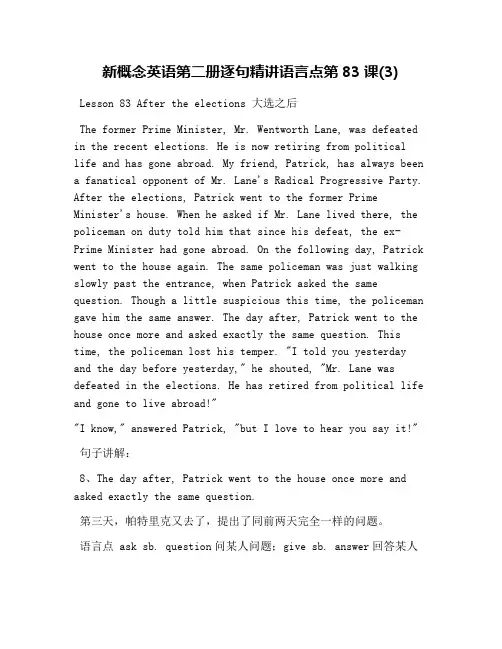
新概念英语第二册逐句精讲语言点第83课(3)Lesson 83 After the elections 大选之后The former Prime Minister, Mr. Wentworth Lane, was defeated in the recent elections. He is now retiring from political life and has gone abroad. My friend, Patrick, has always been a fanatical opponent of Mr. Lane's Radical Progressive Party. After the elections, Patrick went to the former PrimeMinister's house. When he asked if Mr. Lane lived there, the policeman on duty told him that since his defeat, the ex-Prime Minister had gone abroad. On the following day, Patrick went to the house again. The same policeman was just walking slowly past the entrance, when Patrick asked the same question. Though a little suspicious this time, the policeman gave him the same answer. The day after, Patrick went to the house once more and asked exactly the same question. This time, the policeman lost his temper. "I told you yesterday and the day before yesterday," he shouted, "Mr. Lane was defeated in the elections. He has retired from political life and gone to live abroad!""I know," answered Patrick, "but I love to hear you say it!"句子讲解:8、The day after, Patrick went to the house once more and asked exactly the same question.第三天,帕特里克又去了,提出了同前两天完全一样的问题。
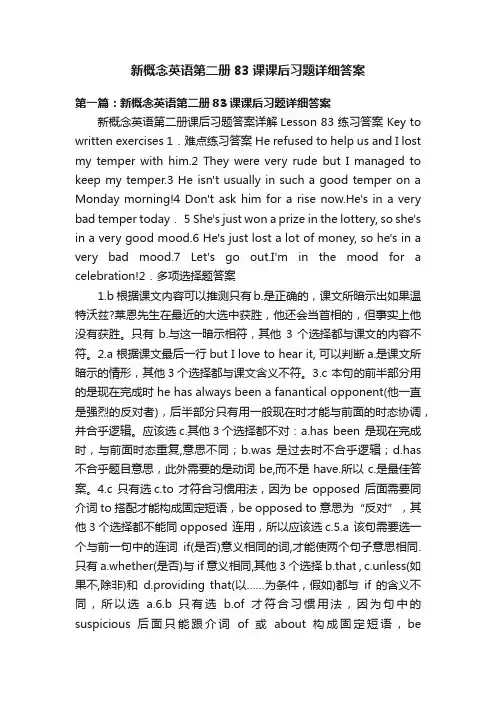
新概念英语第二册83课课后习题详细答案第一篇:新概念英语第二册83课课后习题详细答案新概念英语第二册课后习题答案详解Lesson 83 练习答案 Key to written exercises 1.难点练习答案 He refused to help us and I lost my temper with him.2 They were very rude but I managed to keep my temper.3 He isn't usually in such a good temper on a Monday morning!4 Don't ask him for a rise now.He's in a very bad temper today. 5 She's just won a prize in the lottery, so she's in a very good mood.6 He's just lost a lot of money, so he's in a very bad mood.7 Let's go out.I'm in the mood for a celebration!2.多项选择题答案1.b 根据课文内容可以推测只有b.是正确的,课文所暗示出如果温特沃兹?莱恩先生在最近的大选中获胜,他还会当首相的,但事实上他没有获胜。
只有b.与这一暗示相符,其他3个选择都与课文的内容不符。
2.a 根据课文最后一行but I love to hear it, 可以判断a.是课文所暗示的情形,其他3个选择都与课文含义不符。
3.c 本句的前半部分用的是现在完成时 he has always been a fanantical opponent(他一直是强烈的反对者),后半部分只有用一般现在时才能与前面的时态协调,并合乎逻辑。
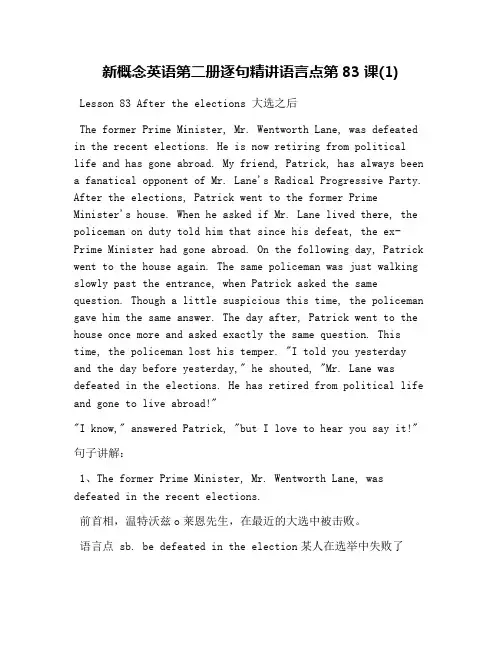
新概念英语第二册逐句精讲语言点第83课(1)Lesson 83 After the elections 大选之后The former Prime Minister, Mr. Wentworth Lane, was defeated in the recent elections. He is now retiring from political life and has gone abroad. My friend, Patrick, has always been a fanatical opponent of Mr. Lane's Radical Progressive Party. After the elections, Patrick went to the former PrimeMinister's house. When he asked if Mr. Lane lived there, the policeman on duty told him that since his defeat, the ex-Prime Minister had gone abroad. On the following day, Patrick went to the house again. The same policeman was just walking slowly past the entrance, when Patrick asked the same question. Though a little suspicious this time, the policeman gave him the same answer. The day after, Patrick went to the house once more and asked exactly the same question. This time, the policeman lost his temper. "I told you yesterday and the day before yesterday," he shouted, "Mr. Lane was defeated in the elections. He has retired from political life and gone to live abroad!""I know," answered Patrick, "but I love to hear you say it!"句子讲解:1、The former Prime Minister, Mr. Wentworth Lane, was defeated in the recent elections.前首相,温特沃兹o莱恩先生,在最近的大选中被击败。
新概念英语青少版第二册第83课Billy′s luckynumberLesson 83 Billy's lucky number第83课比利的幸运号码Narrator:At a school party all the children bought raffle tickets.旁白:在一次学校举办的晚会上,所有的孩子都买了彩票.The first prize was a bicycle.一等奖是一辆自行车.Miss Grant:I want a boy to draw a number.格兰特小姐:我想让一个男同学来抽号码.Children's voices:Go on Billy!孩子们的声音:比利,去呀!Miss Grant:Shut your eyes and draw a piece of paper out of this hat.闭上眼睛,从这顶帽子里抽一张纸.Miss Grant:What number is it?格兰特小姐:是几号?Billy:It's number thirteen.比利:十三号.Miss Grant:Who's got number thirteen?格兰特小姐:谁拿到十三号了.Children's voices:I haven't got it!I haven't got it!孩子们的声音:我没拿到!我没拿到!Miss Grant:That's funny!You must draw another one.格兰特小姐:这可奇怪了!你得再抽一次.Billy:Just a minute!I've got number thirteen.比利:等等,我拿到十三号了.Thirteen's my lucky number.十三号是我的幸运号码.。
新概念英语第二册课后习题答案详解Lesson 83
练习答案Key to written exercises
1.难点练习答案
1 He refused to help us and I lost my temper with him.
2 They were very rude but I managed to keep my temper.
3 He isn't usually in such a good temper on a Monday morning!
4 Don't ask him for a rise now. He's in a very bad temper today.
5 She's just won a prize in the lottery, so she's in a very good mood.
6 He's just lost a lot of money, so he's in a very bad mood.
7 Let's go out. I'm in the mood for a celebration!
2.多项选择题答案
1. b
根据课文内容可以推测只有b. 是正确的,课文所暗示出如果温特沃兹?莱恩先生在最近的大选中获胜,他还会当首相的,但事实上他没有获胜。
只有b. 与这一暗示相符,其他3个选择都与课文的内容不符。
2. a
根据课文最后一行but I love to hear it, 可以判断a. 是课文所暗示的情形,其他3个选择都与课文含义不符。
3. c
本句的前半部分用的是现在完成时he has always been a fanantical opponent (他一直是强烈的反对者),后半部分只有用一般现在时才能与前面的时态协调,并合乎逻辑。
应该选c. 其他3个选择都不对:a. has been 是现在完成时,与前面时态重复,意思不同;
b. was 是过去时不合乎逻辑;d. has 不合乎题目意思,此外需要的是动词be,而不是
have. 所以c. 是最佳答案。
4. c
只有选c. to 才符合习惯用法,因为be opposed 后面需要同介词to 搭配才能构成固定
短语,be opposed to 意思为“反对”,其他3个选择都不能同opposed 连用,所以应该选c.
5. a
该句需要选一个与前一句中的连词if(是否)意义相同的词,才能使两个句子意思相同. 只有a. whether (是否)与if 意义相同,其他3个选择b. that , c. unless(如果不,除非)和d. providing that (以……为条件,假如)都与if 的含义不同,所以选a.
6. b
只有选b. of 才符合习惯用法,因为句中的suspicious 后面只能跟介词of 或about 构成固定短语,be suspicious of/about 意思是“对……感到怀疑”,其它3个选择都不能与suspicious 连用,所以选b.
7. c
本句的时间状语是for some time (一段时间)表示一段时间的状语应该同完成时态连用才合乎逻辑;a. has gone 是完成时,但它表示的是瞬间完成的动作,不应该同表示一段时间的短语来年用;b. went 和d. did go 都不是完成时;只有c. has been 是完成时,可以同表示一段时间的短语连用,表示某种状态持续的时间,所以应该选c.
8. b
本句需要一个同前一句中的形容词former (先前的,过去的)含义相同的词。
a. first (第一的);b. previous (先的,以前的);c. latter (最近的);d. before (以前,在……之前)中,只有b. 与former 的意义和词性相同,所以选b.
9. c
本句需要选一个同前一句中的defeated (被击败)含义相同的词。
a. conquered (被征服的),b. won (被赢得的,胜利的);c. beaten (被击败的);d. destroyed (被毁坏的)中,只有c. 与defeated 的意义相同,所以选c.
10. d
只有选 d. against 才能使此句与前一句Patrick has always been a fanatical opponent(帕特里克一直是强烈的反对者。
)的含义协调一致。
而若选a. opposite(对面)与前一句意义不符,b. anti 一般不能单独使用,它常做前缀表示“反对”,“防”“抗”等,在口语中可以做名词或形容词,意思为“持反对态度的人”,“反对的”,也不适合这个句子,c. at 意思讲不通。
所以d. 是答案。
11. a
本句需要选一个同前一句中的lost his temper (生气,发脾气)含义相同的词组。
a. got angry (生气);b. was in a bad mood (心境不好);c. lost his nerve (畏缩,害怕);d. was in a bad humour (情绪不好,不高兴)中,只有a. 与lost his temper 意义最接近,所以选a.
12. b
本句是需要选一个与前一句中的election (选举)意义相关的词,才能使其意义与前一句符合。
a. marks (分数,记号);b. votes (投票,选票);c. points (点,得分);d. grades (等级,成绩,分数)中,只有b. 的词意义与election 有关,而其他3个选择意义相同,一般都不用来指选举的得票数,所以b.是最佳答案。